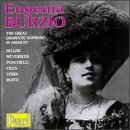| All Artists: Eugenia Burzio Title: Eugenia Burzio Sings Opera Arias Members Wishing: 0 Total Copies: 0 Label: Pearl Release Date: 3/18/1997 Genres: Special Interest, Pop, Classical Styles: Vocal Pop, Opera & Classical Vocal Number of Discs: 1 SwapaCD Credits: 1 UPC: 727031926924 |
Search - Eugenia Burzio :: Eugenia Burzio Sings Opera Arias
 | Eugenia Burzio Eugenia Burzio Sings Opera Arias Genres: Special Interest, Pop, Classical
|
Larger Image |
CD Details |
CD ReviewsA Glimpse of a Bygone Age dwadefoley | New York, New York United States | 04/08/2001 (4 out of 5 stars) "Eugenia Burzio was one of the superstars of the opera world at the turn of the century. Burzio debuted in 1899 and continued to perform until 1919. Known for her hot temper, Burzio was one of the few singers to have stood up to Arturo Toscanini. She sang at La Scala and other great houses in Italy and South America; she performed alongside some of the great singers of the day. The excerpts on this CD date from as early as 1905 and as late as 1913. That any recordings of such a long-ago artist survive is remarkable, and we are certainly privileged to have such a thrilling glimpse of a bygone era available to us. As with most recordings of this antiquity, the first listen is a bit off-putting. The sound is a trifle muffled, and the continual hiss an pop of the Victrola needle is audible. However, as a criticism this is like complaining the Wright Brothers' plane did not have enough seats in first class. We can hardly expect our standard of recording quality to have existed ninety or more years ago. Therefore, there is a degree to which we must admit that we are getting only a shadowy idea of what the great diva must have sounded like in performance. In addition to recording technology, singing was a different art at the turn of the century. Burzio's career came after the bel canto operas of Bellini and Donizetti had largely disappeared, and any singer capable of singing them up to the standards of those composers' times would have been a rara avis, indeed. The drama in opera had superceded the pure art of singing, and the verismo movement was in full force. Thus, her performances of excerpts from Norma and Pacini's Saffo are not what we who were raised on Callas, Sutherland, and Caballe might expect. But Burzio was a true dramatic soprano, a vocal ancestress of Milanov, or perhaps even Tebaldi. To hold her interpretations of these works to the standards of these coloratura specialists would not be appropriate. As to the sound, the record needle and the lack of crispness actually became comforting, creating a warm, nostalgic feeling once I acclimated to it, and eventually sounded quite natural to me. Thus, my enjoyment of this recording came only after working to put aside a certain degree of prejudice created by past listening experience. The effort was well worth it. Burzio's hot-blooded interpretations of these arias are what serious opera is all about. Every piece is sung with great feeling and pathos. Burzio's tone, if we are to judge by this recording, was round and very rich, as solid in the chest register as in the high notes. She was capable of some beautiful pianissimos when the situation demanded it, but in general, subtlety and restraint were not her approach to drama. Gasps of desperation, glottal noises, sobs interpolated between notes, and heavy rubato are devices she took (perhaps extreme) liberties with. Her "Oh patria mia" from Aida is a perfect example. Her Norma excerpts, while they probably would make the fastidious Bellini shiver in his grave, are nonetheless intensely moving and charged with emotion. I was enthralled with the Act IV duet from Trovatore "Mira di acerbe lagrime", with an unidentified baritone as DiLuna, in which her desperate pleading is both heartfelt and heartrending. Equally thrilling is her impassioned interpretation of "Ma dall'arido stello" from Un Ballo in Maschera. She is at her most convincing in her two brief arias from Romano's Zulma, a verismo work, which music allows her to exercise her powerful voice and acting ability to their fullest. The liner notes could have been more detailed, as there is only a short biographical essay and there is no information about the operas represented on the disc. No translations, or even Italian libretti, are included. In the case of Zulma and Pacini's Saffo, this would be helpful to most listeners. This recording is an acquired taste, but it continues to delight me more and more with each time I listen, and each hearing reveals something new."
|

 Track Listings (21) - Disc #1
Track Listings (21) - Disc #1